A remark that is often made to me, as a stand up thinker, could be summarised as the following;
How does one make philosophy dramatic, or exciting, or even relevant? Surely it is dry as dust, and boring? It is, after all, merely smug clever-idiots playing word games and never resolving anything...
Now I am not denying that this remark does cover rather a lot of what passes for philosophy. It has more than its fair share of logic choppers, and meaning(less) wallahs. And yet, the remark is surely wrong-headed for all that. For what is more exciting or more challenging or more simply interesting than really thinking? If philosophy is not fundamentally engaging, and engaging on some level for everyone, then it is nothing. The game is though, always to find that level, and it is this that the stand up show explores.
There are essentially two main strategies which I have developed within the show. The first, attempts to really get under the personality of a thinker, or perhaps better, to give personality to their works. The aim is therefore to give life to thought, and explore how ideas relate to contexts, passions and history. In these pieces I am doing a lot of 'filling in' of the historical biographies of the thinker, but doing so almost incidentally, so that when I do it right, the audience should get the feeling of a cloud of events, a history which they can appreciate in itself (as another time) and yet also feel it reflects their times. It is out of these events and histories that the ideas I am developing, arise. More than that, the revelations of thinkers must comment upon or even resolve the passions such events cause, both then and now. The performance is therefore designed to build context, share emotions, and only then to really communicate ideas as a resolution to these situations and feelings.
I hope you can see what I mean in this very short video.
The second main approach is more obviously ideas-based. I love taking a thinker, or an idea that either we think we know very well, or else regard as frankly bizarre, or think of as too difficult to bother with, and then showing how, actually, in the context of our lives, the idea really does make sense and is important by performing it. I see myself as freeing ideas of their 'assumed' philosophical context, and letting them speak for themselves, and to our times once again. Take for example Leibniz's assertion that this is the best of all possible worlds. This argument was hooted out of history from Voltaire onwards. And yet, when you put it in the context of the kind of moral argument Leibniz was certainly making, it becomes a real proposition once again - a battle-cry which calls to us to be worthy of life itself. The trick with the lectures is to pitch them right, so that although I am often 'doing real philosophy' in them, it does not feel too difficult to a general audience, and catches their attention long enough for them to get something out of it.
I hope this video illustrates something of this.
For me, the point of philosophy, is that it is as challenging and as urgent as more conventional drama, and the game is merely to show that this really is the case. Does it work? I hope so, but judge for yourself.


No comments:
Post a Comment